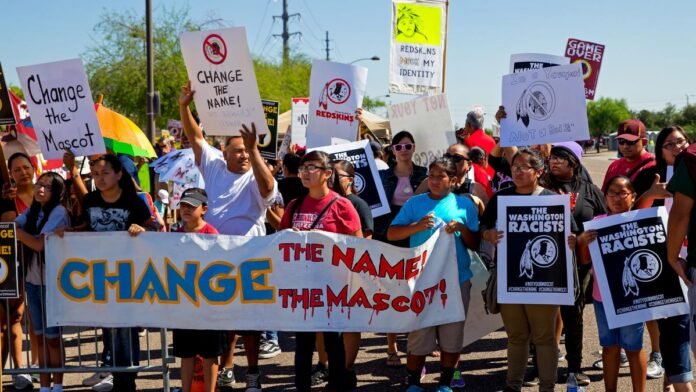Native American groups had fought for years to get Washington’s NFL team to change its name. Trump just renewed the battle.

Trump threatens Washington Commanders over franchise name
President Trump is demanding the Washington Commanders revert to their original name and threatening stadium plans if they don’t comply.
WASHINGTON ‒ Native American groups fought for years to get this city’s National Football League team to change its name.
Now, President Donald Trump wants to change it back to a moniker many Native Americans consider offensive and disrespectful.
“No Native American child should have to sit through a pep rally or in a stadium where their culture is being mocked,” said Jacqueline De León, senior staff attorney for the Native American Rights Fund.
Trump threatened over the weekend to block a deal to build a stadium in Washington, D.C., if the Washington Commanders team refuses to revert to the name it had from 1937 when the team moved from Boston until 2022.
“The Washington ‘Whatever’s’ should IMMEDIATELY change their name back to the Washington Redskins Football Team,” Trump posted on his Truth Social site. “I may put a restriction on them that if they don’t change the name back to the original ‘Washington Redskins,’ and get rid of the ridiculous moniker, ‘Washington Commanders.’”
In a post the same day, Trump said Native Americans would welcome the change.
“Our great Indian people, in massive numbers, want this to happen,” he wrote in a post that also encouraged the Cleveland Guardians to revert to a former name. “Their heritage and prestige is systematically being taken away from them. Times are different now than they were three or four years ago. We are a Country of passion and common sense. OWNERS, GET IT DONE!!!”
But that’s not what USA TODAY found when reaching out to Native American activists.
Native Americans are not mascots, said Savannah Romero, a member of the enrolled member of the Eastern Shoshone Nation, who urged city officials not to yield to the name change.
“We are language keepers, land protectors, survivors of attempted genocide, and a part of sovereign nations,” Romero, co-founder and deputy director of the BLIS (Black Liberation-Indigenous Sovereignty) Collective Collective, said in a statement. “To equate Native people with cartoonish mascots alongside animals is a gross and ongoing tactic of dehumanization.”
‘Disrespectful to the pain and suffering’
Trump’s move comes in the wake of efforts across the country to ban the use of Native American mascots and logos in schools, including in New York.
The Native American Rights Fund supported efforts in New York to ban the use of such mascots. It recently released a video pushing back against the use of Native American mascots.
In a June 17 announcement, the Department of Education called the ban “an unlawful attempt to ban mascots and logos that celebrate Native American history.’’
De León said that challenge is part of the larger narrative by the Trump administration to muddy the waters and undermine civil rights protections. It’s not racist to push back against racism, she said.
“Native Americans are being used as tools for a distraction,” De León said. “That’s very disrespectful to the pain and suffering imposed on Native people by inaccurately depicting our culture.”
Beth Wright, a member of Pueblo of Laguna, said the United States has long tried to erase Native identity and culture, including through federal Indian boarding schools, banning Native religious and cultural practices and seizing control over Native lands.
“Native people are still working to revitalize what the United States tried to erase,’’ said Wright, a staff attorney with the Native American Rights Fund. “Native mascots work directly against these efforts by perpetuating false historical narratives about Native people and false depictions of who Native people are today.’’
‘It’s a slur’
In 2013, the Leadership Conference on Civil and Human Rights, a coalition of more than 200 groups, approved a resolution calling for owners of the Washington team to change its name.
The resolution called for the elimination of names and mascots “that promote negative stereotypes and connotations or that trivialize Native American cultures.’’
De León, who had lived in the Washington, D.C., area for several years, said it hurt when she saw people wearing shirts with the old name.
“I don’t even like to say the word because it’s a slur,” she said.
